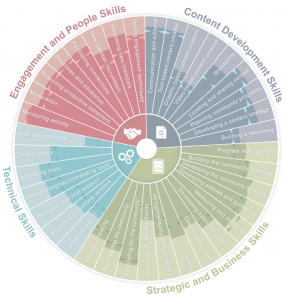By Ted McEnroe, The Community Roundtable
Sometimes, the theme for the week is planned – other times, you see it emerge. Looking back at this week, we have been spending a lot of time thinking about internal communities, intranets and ESNs.
 Rachel shared some thoughts earlier this week on the J. Boye blog. In a post entitled “Want a Social Intranet? Have a Plan!” she noted the critical need for roadmaps to give structure and plans to expanding your internal community. The benefits of a social community, getting people to share, work out loud and communicate differently are huge, she notes, but getting people to change behavior needs more than just the opportunity to do so – it needs a plan to help them through the process.
Rachel shared some thoughts earlier this week on the J. Boye blog. In a post entitled “Want a Social Intranet? Have a Plan!” she noted the critical need for roadmaps to give structure and plans to expanding your internal community. The benefits of a social community, getting people to share, work out loud and communicate differently are huge, she notes, but getting people to change behavior needs more than just the opportunity to do so – it needs a plan to help them through the process.
On our own blog, we took a look at another busy month inside our own community, TheCR Network. Hillary shared some of the great roundtable calls of the past month – including member-inspired calls on employee advocacy, the future of the Intranet and platform migrations. Want full access to what was said? It all comes with membership in TheCR Network.
And as we continue to highlight the report, infographic and brand new eBook on our Community Manager Salary Survey research, Shannon looked at the best ways for community professionals to network.
What we’re reading this week:
Want a Social Intranet? Have a Plan!: The benefits of getting people to work out loud, share what they know and ask questions publicly is huge – in cost savings to the organization and in the innovation that springs from that – but getting people to change behavior can be very challenging and it certainly won’t happen if you don’t create the programming, support and incentives for them to do so.
More Collaboration Equals More Value: Collaboration is hard. It’s messy. And it seems to be time consuming. Some believe that you get much more done when you don’t collaborate. But what is it you get done? One manager told me that he didn’t have time to collaborate. My reply was: “So, you don’t have time to do it right, but you do have time to do it wrong?”
How the Future of Work Leads to the Future of Organisations: The Möbius strip and the Klein bottle – its three-dimensional equivalent – have only one side. The inside is the outside. This metaphor is extraordinarily apt for organisations today, where the inside and the outside need to be one. The internal values and culture must be identical to those manifested outside, the social networks externally must be merged with the internal ones, it should become irrelevant where work is performed as the formal boundaries of organisations dissolve.
Designing Good Policy for Online Platforms and Communities: Designing good policy is hard work! And the ones you hear about — the ones that make the news — are just the tip of the iceberg. If you find yourself faced with that “we need a policy for this” moment, here’s a few best practices when it comes to designing policy for online communities and platforms.
Online Community and Culture Wars: What Do We Know?: “As noble as we wish we are, we’re not — given the choice, people hang out with people like them,” says Koster. “Given a limited population, over time, not only will we [form] groups that are like us, but the larger group will exterminate the other one,” he says. “In simulations, that’s what happens: They literally commit genocide, they literally chase everyone else out of the room. It’s a distasteful fact about human nature, and if our definition about who we are is rigid, then you’re going to have that conflict.”
Why Branded Communities Wither Away, plus 5 Ways to Prevent Digital Death: You can find hundreds of press releases from delighted brands announcing the launch of their online community. Almost all of them vanished from the internet within 18 months. So why do we keep building them?
New community and social media jobs this week:
Global Community and Social Media Manager – EY, New York, NY
Community Manager, Cameo – Vimeo, New York, NY
Community Manager, Socialmedia.org – Gaspedal, Chicago, IL
Social Media Senior Manager – Taco Bell, Irvine, CA
Community Manager – Healthsparq, Portland, OR
Community Manager – RallyPoint, Watertown, MA
Multicultural Community Manager – Allstate, Northbrook, IL
Social Media Community Manager – Dropbox, San Francisco, CA
Content and Community Manager – Expa, San Francisco, CA
Director of Content and Communications – Lavastorm Analytics, Boston, MA
Community Manager – National Marketing – Kaplan Test Prep, New York, NY
Director of Global Media – Citi, Long Island City, NY
Content and Community Manager – Flatiron School, New York, NY

